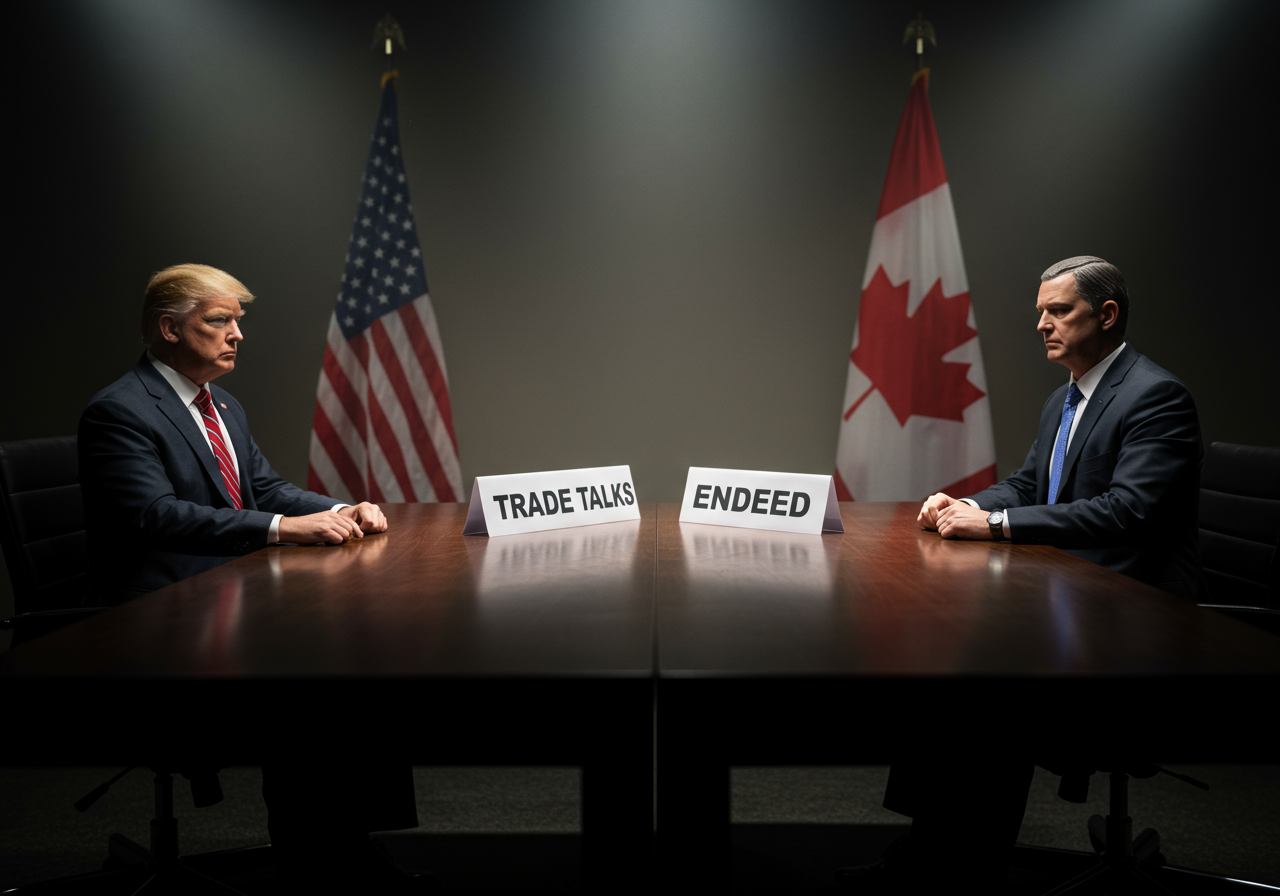In a surprising turn of events, the United States has announced the cessation of all trade talks with Canada, citing an unresolved tax dispute as the underlying cause. This decision marks a significant shift in the diplomatic and economic relations between the two neighboring countries, which have traditionally enjoyed a robust trade partnership.
According to the recent announcement from the Office of the United States Trade Representative, the decisive move comes after prolonged negotiations failed to resolve key disagreements over tax policies affecting cross-border commerce. These disputes have reportedly led to increased tensions, prompting the U.S. to call off plans for further discussions.
The Tax Dispute Explained
The core of the dispute revolves around what the U.S. perceives as unfair Canadian tax measures that disproportionally affect American businesses operating north of the border. Specifically, the focus has been on Canada’s digital services tax, which the Trump administration claims unfairly targets U.S. tech giants. This tax, argued to be discriminatory, has sparked significant controversy and has been a sticking point in talks aimed at fortifying bilateral trade. In addition, American manufacturers, particularly in the automotive sector, have raised concerns about tariffs and regulatory policies deemed as protectionist by U.S. officials.
These issues have culminated in a complex web of grievances, with both nations voicing concerns over the potential for economic fallout. While Canada defends its policies as essential measures for protecting domestic industries and ensuring fair competition, the U.S. sees them as hindrances to a level playing field.
Implications for North American Trade
The suspension of trade negotiations comes at a critical juncture for North American trade relations. With the United States-Mexico-Canada Agreement (USMCA) having replaced NAFTA in recent years, today’s developments threaten to unravel efforts aimed at regional economic integration.
This rift holds potentially significant implications for industries reliant on cross-border trade, especially in sectors such as agriculture, automotive manufacturing, and technology. Analysts warn that the existing supply chains could face disruptions, potentially leading to price increases and availability issues for consumers.
Beyond tangible economic impacts, the decision signals a shift in geopolitical dynamics. As two of the world’s leading economies, both the U.S. and Canada wield influence that extends well beyond trade statistics. Their relationship is not just about commercial interests; it also encompasses a shared commitment toward security cooperation and global stability.
Industry Reactions
The announcement has prompted varied reactions from industry stakeholders. U.S. business leaders have expressed apprehension about the economic implications of halted negotiations. As many companies have invested heavily in Canadian markets, uncertainty now looms over future strategies and operations.
On the Canadian side, industry organizations are voicing concerns about the repercussions on their domestic market, highlighting potential retaliatory measures in response to U.S. trade policies. Respective chambers of commerce have urged both governments to return to the negotiation table promptly to avert economic disruption.
In particular, the automotive sector, a significant pillar of North American manufacturing, is closely monitoring developments. The smooth flow of parts and vehicles across the Canada-U.S. border is crucial for maintaining production efficiency and competitiveness in a global market.
Political Reactions and Next Steps
While the discontinuation of talks dominates headlines, it has also prompted swift political reactions. U.S. lawmakers from both parties have expressed differing views; some support the administration’s hardline stance on trade fairness, while others advocate for renewed dialogue and resolution through diplomacy.
In Ottawa, Canadian government officials reaffirm their commitment to seeking equitable trade relations while expressing disappointment over the abrupt halt in negotiations. An official statement emphasized the importance of constructive engagement to resolve differences and foster mutual economic growth.
Moving forward, diplomatic channels remain open, with both sides signaling a willingness to revisit discussions under conditions that ensure fairness and mutual benefit. Experts suggest leveraging multilateral platforms to mediate the conflict, potentially involving international trade organizations in facilitating dialogue.
Historical Context and Future Prospects
The U.S.-Canada trade relationship has long been a cornerstone of North American economic interaction. From the days of the Auto Pact to the inception of NAFTA, these nations have cultivated a trade framework that underscores cooperation and shared prosperity.
Historically, trade disagreements have arisen and, on many occasions, been resolved through negotiation and diplomacy. This latest impasse, while serious, is not unprecedented.
Looking ahead, stakeholders on both sides of the border remain hopeful for a resolution that paves the way for robust economic partnerships. While immediate remedies are uncertain, precedent suggests that strategic dialogue will be the key to reconciling differences and restoring amicable relations.
In a global economy increasingly characterized by interdependence, both nations recognize the value of preserving a collaborative approach to trade. As such, efforts to reinstate negotiations reflect an understanding of shared interests and common goals that transcend individual disputes.
